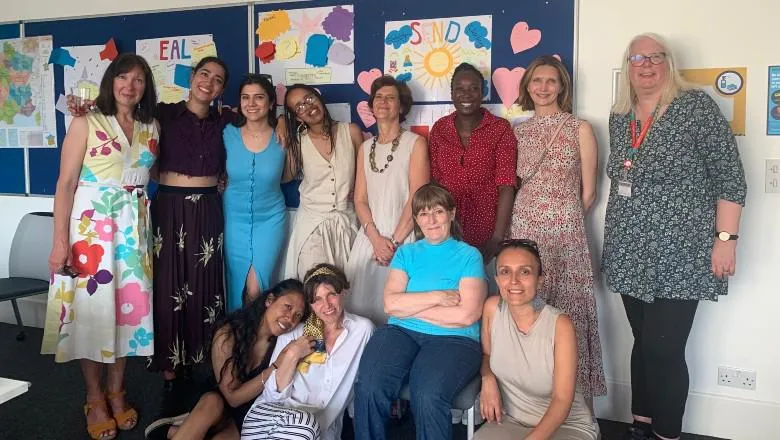The languages curriculum is very well situated to be a starting point for thinking about decolonisation, for addressing inequalities in education and for transformative education: thus decolonising the MFL curriculum project is a vital part of work that understands and promotes the importance of a truly inclusive approach to language teaching and learning, that recognises intersectionality and the value and importance of having teachers, students and pupils at the centre of the process of the decolonising journey.
Dr Christina Richardson, Senior Lecturer in Language Education, School of Education, Communication & Society
26 July 2023
More needs to be done to decolonise language teaching, King's project team says
Over the course of 10 workshops, lecturers from the School of Education, Communication & Society (ECS) and the King’s Language Centre (King’s LC) have explored how to decolonise the Modern Foreign Languages (MFL) curriculum and language teaching.

The project team, led collaboratively by Dr Jane Jones and Dr Christina Richardson in King's ECS and Dr Tanya Linaker at King’s LC, discussed the meaning of decolonisation and considered practical ways to decolonise the curriculum and deliver a more diverse, inclusive and representative curriculum and modes of learning.
Throughout the academic year 2022/23, they organised workshops to engage not only their respective teams but also King’s students and guests from other institutions, to reflect on deconstructing the content and pedagogy of teaching languages and culture.
They found that the process of decolonising language teaching will require both mindset changes and practical adjustments – starting with shifting from Eurocentricity to multicentricity, especially in the Global South. Teaching staff in schools and universities need to be more diverse, and students listened to in all developments and aspects of policy.
There needs to be a holistic approach that takes on board not just colonial histories but also intersectionalities with gender, race, family structures, cultures, and individual identities. It is essential to be aware of the emotional basis and sometimes stress caused by decolonising processes.
While many teachers have been revising and expanding their materials and resources to ensure a greater community and global representation, they need to be better supported. This could take the form of a framework and set of principles to scaffold their work. In particular, more should be done to make pedagogies and assessment more diverse.
Jane Jones, Senior Lecturer in Education in ECS, said: "I came to realise how the curriculum decolonising project enabled each individual to understand and interpret in their own way what needed to be done and how it might be enacted. It starts from each individual’s lived experience and continues as a reflective project to decolonise the mind as well as the very practical implementation of MFL curriculum revision.
"I was particularly interested to promote student teachers as researchers in the project – a great success – and thereby in a generative research process of inquiry as they begin their teaching careers. I was also interested to promote the pupil voice as a critical reality and not just a piece of rhetorical discourse.
"As personal reflections enjoined collaborative research and discussion, the project became ever more powerful, increasing agency and understanding. There is still much work to do but MFL is an ideal space to progress this work."
Tanya Linaker, Team Leader for Slavic and Middle Eastern Languages at King’s Language Centre, said: "The project enabled me to delve deep into the issues of what decolonising the language teaching curriculum means to me personally as well as to my colleagues, students and the academics across the field.
"I realised that a nuanced, culturally sensitive and differentiated approach is needed to discuss highly contested aspects of postcolonial, post-imperial and post-Soviet identity through the intersection of culture, ethnicity, sex, gender, race, religion and social status. While we aim to decentre the status quo and give voices to those who have not been heard before, we should be careful not to tip the balance of power in such a way as to disadvantage one group over another."
Christina Richardson, Senior Lecturer in Language Education in ECS, said:
"My main points of learning from the project are 1) how complex and potentially sensitive discussions around decolonising the curriculum are; 2) the variety of perspectives and positions that teachers may take on decolonisation; and 3) the value of arts-based methods/tools as a starting point for reflecting on one's own identity, assumptions and preconceptions."
Supported by the King's Race Equity & Inclusive Education Fund, the project concluded on 13 June at an international gathering, with teachers joining the seminar from La Plata, Argentina and colleagues from King’s link school in Paris, France.
As they continue discussions on decolonising the MFL curriculum, which is an ongoing endeavour and long process, the project team is planning to work on decolonising lesser taught languages and starting a new collaboration with the ECS partner school in Paris.





